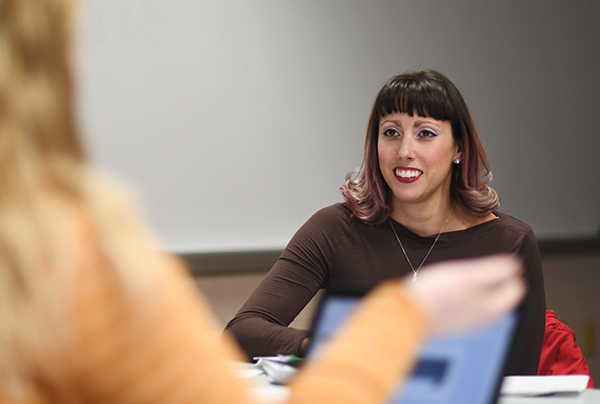News
Criminal Justice Class Develops Empathy for Positive Impact
11/26/19
 Ashley Mullinax aspires to be a victim advocate, helping people through some of the hardest situations of their lives.
Ashley Mullinax aspires to be a victim advocate, helping people through some of the hardest situations of their lives.
One of the last classes of Mullinax’s career as a criminal justice major at Dalton State College has given her insight into societal problems she believes will help her better serve victims in Northwest Georgia. Dr. Natalie Johnson’s upper level criminal justice course, Advanced Criminological Theory, explores why people commit crimes and what drives legislation.
Discussions and coursework center around current events and provide an in-depth explanation as to why society faces the problems it does. And, the course is taught by the students.
“We have to know the material because we’re the ones teaching,” said Mullinax who is graduating this semester. “It has given us more insight on these topics because of that.”
Johnson structures the course much like a graduate level seminar. It is a hybrid course that meets in person once a week and other discussions happen online. Students are required to find peer-reviewed articles and current events that support each week’s assigned topic to lead the discussions.
“They are learning how theories apply to policy and laws,” Johnson said. “Many of our students want to go on to graduate school or law school. So this class really prepares them to take that next step academically.”
The class covers topics such as drug addiction, child abuse, human trafficking, domestic violence, hate crimes and bigotry, as well as societal stressors and strains such as how high poverty rates impact society.
 “We get personal in our discussions,” Johnson said. “We have a rule that what’s discussed in class stays in class. It has created a close community in this class because we’re able to talk openly.”
“We get personal in our discussions,” Johnson said. “We have a rule that what’s discussed in class stays in class. It has created a close community in this class because we’re able to talk openly.”
The class also went to Conasauga Drug Court, as well as a staff meeting prior to court. Drug court is an intense rehabilitation program that addresses the underlying reasons a person develops an addiction. Attending allowed students to see first-hand how what they’re learning in class applies in the real world.
“We’re able to see why the material in this class matters,” said Brittany Cooley, who is graduating this semester. “We are seeing how we can make improvements in society. Even though this is a theory class, we’re learning real-world applications, and we’re seeing how to collaborate with other agencies to make a change.”
For Ty Owensby, who is also graduating this semester, the class has made him ask why people aren’t making changes quicker in society. Change is slow, and the longer it takes to make, the longer the cycle is perpetuated.
“This class has shifted the focus from seeing a person as a criminal to seeing them as a person,” Owensby said. “This class humanizes them. We start to see why people commit crimes, and we see them not as offenders but as victims themselves. With concepts like labeling theory, we see the deep impact words can have on a person. You hear the saying, ‘sticks and stones may break my bones but words can never hurt me,’ and it’s not true. Words are powerful. This class is more than learning theory. It’s learning what we’re going to do with the knowledge we have.”
Lindsey Foster, who will graduate in May, plans to work with high-risk juveniles.
“This class is leading me to know why a child or adolescent behaves a certain way,” she said. “I can now look at all aspects and see the why. It will help me better serve juveniles. I like how this class has allowed us to take control of the discussions. We can tailor them to what our specific interests are. And since this is a small class, we’re able to build connections. I now have a network of peers that I can call on when we are in the workforce.”
